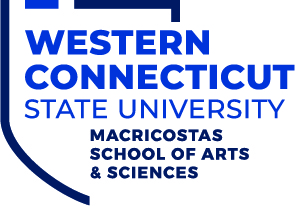
Dr. Stephen “Mitch” Wagener
Chair at the Jane Goodall Center
Professor, Department of Biology & Environmental Sciences
This is the third in a series of faculty interviews conducted and written by talented WCSU MFA student, John Bonanni. Our goal is to celebrate and learn from some of WCSU’s dedicated teachers and scholars.
Convergence, Connection, and Results:
Enlightenment from an Unpretentious Scholar
Be careful not to misinterpret the folksiness of Dr. Wagener to be an impassive approach to his profession. It is, in fact, the core element of his teaching philosophy. “Mitch”, as he prefers to be addressed, politely abstains from any formal educational theory, though he is quick to express support and appreciation for colleagues whose theories work for their students.
His theory is no theory. In fashioning a learning perspective for students, Dr. Wagener emphasizes connection. “Look at the humanity of it,” he advises. Referring to his students, “These are not robots. Theory won’t help if the basis of humanity is not met.”
Part of that expression of humanity is an instructor’s ability to admit they are part of the process of learning. “We don’t know everything,” he claims. That perspective sets the basis for 23 years of successful connection to the changing diversity of his students. Dr. Wagener creates an invitation to partner in discovery, where the fence between provider and receiver are dismantled through accessibility and relationship.
He has an inviting, non-threatening, demeanor that encourages an educational fellowship. “I’m a hillbilly from the Ozarks,” he enjoys proclaiming, setting a comfortable tone for his next comment, which is bound to be erudite and profoundly relevant. His approachability stems from the personal comfort of living a multicultural home life. He spent a year as an exchange student in Thailand, where he became used to being “the strange looking person in the school”. Rita, his wife of 35 years, is Ugandan, and both attended the University of Alaska. Beyond science, his concentrations included Russian studies. Both he and Rita have lived in Belize. He spent time in Russia. He considers his grandchildren “21st century children.” He feels these experiences prepared him to easily connect with immigrant students who are comfortable sharing the “good things and bad things” of their lives with him.
His advice to first time instructors?
Find the way to relate to the issues of the world of today that will be of concern going forward. Teach “with your head and heart.”
Believe in the potential of your students. Dr. Wagener senses “this generation [millennials and GenZ], despite the criticism from us old folks, have more going for them than what we give them credit for.”
The professor’s most dynamic innovation is the crafting of an honors class where a multi-disciplinary approach is implemented. As an ecologist and tenured faculty member, Dr. Wagener uses the opportunity to develop competencies in a grouping of related fields that can enhance the relevance of the syllabus to meet contemporary challenges. As an example, he incorporates human history, ecology and climatology; connecting with specialists in each field to maintain continually changing information that relate to the quality of life outside the campus. Students are then equipped with time-sensitive information to become informed problem solvers.
“Teaching is just about the most humane thing you can do.”
The professor advocates the importance of delivering academic product to the public to enhance accurate comprehension of issues beyond partisan considerations. Students furnished with useful knowledge become decision-making members of society, creating the embodiment of an informed public. This is the professor’s defining pedagogical mission.
Dr. Wagener envisions an aesthetic inclusion into the science curriculum. He notes that an “academic life is a creative life. More non-scientists are writing books about climate change.” That collaboration will enhance the scope of understanding and arm the student with a communicative advantage in dispersing this information to the public.
The professor prefers the teaching atmosphere of Western over a research university environment. “You can mold your career around your talents rather than being in a place where you may not fit in or have the chops to be successful here.” The school’s size is “small enough you have repeat students, so you get to know them, and a relationship develops. You become a mentor.”
We exist in an “unsustainable environment,” the professor reminds us. The relevance of his didactic philosophy addresses the urgency to deliver accurate information to a world where traditional economic perceptions threaten the quality of life. The intimate relationship of ecological and climatological health is not only a multi-disciplinary academic exercise, it is the basis of convergence where scientists, economists and artistic vision can fashion an operating environment of sustainability and function.
Dr. Wagener summarizes the initiative in the words of a fellow Midwesterner of unpretentious origins:
The dogmas of the quiet past are inadequate to the stormy present.
The occasion is piled high with difficulty, and we must rise to the occasion.
As our case is new, so we must think anew and act anew.
We must disenthrall ourselves, and then we shall save our country.
-A. Lincoln, 1862
Interview conducted by John Bonanni & Ronald Samul
Author Bio: John Bonanni spent the last forty years in the theatre on tour, on Broadway, at Radio City Music Hall and many places in between managing every sensitive personality he encountered. He now writes about them, among other things. His articles have appeared in Adelaide Literary Magazine, Inspired Living Magazine, and Senior Outlook Today. He is currently enrolled in the MFA in Creative and Professional Program at Western Connecticut State University. theliteraryfish@gmail.com